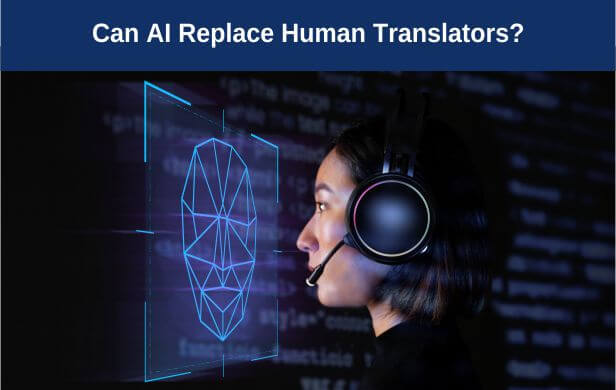
In our increasingly globalized world, translation is pivotal in facilitating communication across languages and cultures. With the rapid advancements in Artificial Intelligence (AI), the question arises- Can AI replace human translators? This blog aims to explore the current state of AI translation technology, debunk common myths, and emphasize the use of AI by human translators in achieving optimal translation outcomes.
AI-powered translation tools, such as machine translation (MT) and neural machine translation (NMT), have significantly progressed in recent years. They can quickly process vast amounts of text, provide instant translations, and have become increasingly accurate in conveying meaning. AI translation systems learn from vast datasets and employ complex algorithms, enabling them to handle various language pairs efficiently. These tools have undoubtedly improved productivity, especially for basic and repetitive translation tasks.
Despite AI's advancements, it is essential to dispel some common myths about AI replacing human translators entirely. Firstly, language nuances, cultural context, and idiomatic expressions often require human expertise to ensure accurate and culturally appropriate translations. AI, while proficient in certain domains, may struggle with these intricacies. Creative texts like literature or marketing materials demand human interpretation, adaptation, transcreation, and a nuanced understanding that AI may not fully grasp.
Another myth is that AI translation eliminates the need for human translators altogether. While AI tools can assist in generating initial translations, they often require human intervention to refine and polish the output. Human translators bring essential skills, such as subject matter expertise, cultural sensitivity, and a deep understanding of context, ensuring high-quality translations that resonate with the target audience.
Rather than viewing AI as a competitor, embracing working on AI by human translators and it holds tremendous potential. AI can enhance efficiency by automating repetitive tasks, offering suggestions, and aiding in terminology management. This empowers human translators to focus on higher-level linguistic and cultural aspects of translation, ensuring accuracy and nuance.
AI-powered translation tools can serve as valuable aids in the translation process. Human translators can leverage these tools to increase productivity, verify consistency, and access vast linguistic resources. Additionally, AI can assist in handling large volumes of content, enabling human translators to meet tight deadlines without compromising quality.
While AI can handle routine and technical translations, certain domains necessitate human translators' expertise. Industries like legal, medical, and marketing require cultural adaptability, knowledge of the subject matter, and the ability to accurately convey tone and intent. Human translators excel in understanding the nuances and idiosyncrasies of languages, ensuring translations resonate with the target audience on a deeper level.
Moreover, human translators possess ethical considerations and professional judgment that AI cannot replicate. They adhere to strict confidentiality standards, carefully handle sensitive information, and navigate complex ethical dilemmas. Human translators are adept at identifying cultural sensitivities, adapting translations to specific audiences, and maintaining a human touch that fosters understanding and connection.
Conclusion:
AI translation technology has undoubtedly transformed the translation landscape, improving efficiency and accessibility. However, the idea that AI can replace human translators remains a myth. While AI tools can handle routine translations and offer invaluable support, human translators bring irreplaceable skills, cultural understanding, and adaptability to the table.
Ultimately, the future lies in technology enhancing human capabilities rather than replacing them. By embracing this symbiotic relationship, translators can unlock the full potential of translation, bridging language barriers and fostering global understanding and connection.
For any queries related to language translation services. Inquire at our email address below or give us a call today!
info@languageservicesbureau.com
Telephone: +91-20-24470509, +91-82370 60559
Similar articles for you...

आमच्या गेल्या महिन्यातील ब्लॉग मध्ये भाषांचे ज्ञान आवश्यक असणाऱ्या करियर क्षेत्रांची माहिती आपल्याला मिळाली. जिथे भाषेचे ज्ञान फायद्याचे ठरते असे इतर व्यवसाय आपण या महिन्यात पाहुयात.

Posted by : Language Services Bureau

The time it takes to learn a language depends on what you want to do with it– here is a great article about language learning and the kind of expectations you can set about the time required for the same!